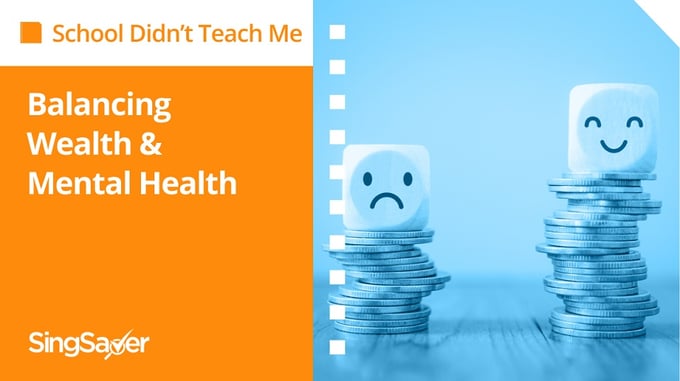Formal education may give us a leg up in life and career, but less so on managing money. School Didn’t Teach Me, a SingSaver series, is your informal education in personal finance.
Plenty of studies have shown a long-drawn correlation between wealth and physical health, as observed through income’s effect on multiple health indicators across a lifespan. But what about mental health?
Over the years, many longitudinal studies have documented the strong association between wealth and health. In fact, one of the social determinants of health is income itself.
Essentially, individuals with greater income levels enjoy higher standards of living with greater access to health services and facilities. As a result, they experience lower chances of chronic illnesses and enjoy better functionality throughout life.
The converse is true where cyclical poverty and perpetual disease or fatality go almost hand in hand.
Just as low income contributes to poorer health conditions, poor health directly affects one’s ability to work and earn a living — thereby, creating a negative feedback loop.
This is known as the health-poverty trap.
A similar perspective can be applied to mental health.
Everyone’s often caught up in the capitalist rat race, climbing up the corporate ladder at the expense of their mental wellbeing. At some point, it becomes neglected entirely. Throw the COVID-19 pandemic into the mix, and you have a whole slew of challenges threatening to destabilise multiple facets of life.
How then, might a working adult attain a balance between monetary pursuits and a healthy mindset?
Table of contents
- How does wealth affect mental health
- How does mental health affect wealth
- Working towards a healthier financial mindset
- Building mental and financial resilience
Disclaimer: This article touches on potentially triggering mental health topics. Reader discretion is advised.
Start managing and saving money like a pro with SingSaver’s weekly financial roundups! We dole out easy-to-follow money-saving tips, the latest financial trends and the hottest promotions every week, right into your inbox. This is one mailer you don’t want to miss.
Sign up today to receive our exclusive free investing guide for beginners!
In what aspects does wealth affect mental health?
The World Health Organisation (WHO) estimates roughly 280 million people globally are suffering from depression.
Although correlation doesn’t equal causation, suicide is a possible symptom development to which, 700,000 people succumb to it every year. It’s also the fourth leading cause of mortality among youth aged 15 to 29 years old.
Even so, those living in the lower socioeconomic bracket are at a greater disadvantage because they have less access to necessary medical treatments.
A 2021 survey conducted by the Institute of Mental Health (IMH) and the University of Hong Kong revealed that 13% of 1,058 respondents experienced forms of anxiety or depression accruing to COVID-19.
Out of this sample, the top three stresses stemmed from the fear of friends and loved ones contracting COVID-19, financial loss (e.g. losing work opportunities or taking unpaid leave), and unemployment.
Evidently, source of income, employment and overall wealth are crucial factors attributing to an individual’s mental and emotional wellbeing. COVD-19 has only intensified the fear of financial instability to a debilitating standpoint for many, says Dan Geller on behalf of Analyticom, a behavioural economics research firm in San Francisco.
Then, in what aspects does mental health affect wealth?
The stigma surrounding mental health is still high before and during the pandemic. Past studies have shown the economic costs and productivity losses incurred by individuals with mental disorders were higher than those without.
Annual cost estimates of seeking mental health treatment were reported to hit a staggering amount of almost S$3,940. And note, these treatments aren’t a one-time thing. They are recurring, and medical bills will accumulate quickly.
This perpetuates the toxic cyclical nature between wealth and mental health:
Experiencing anxiety and depression over financial insecurity → Seeking treatment for mental health → Incurring medical costs over time → Causing greater stress on both financial and mental wellbeing
Some other ways mental health can affect your relationship with money include:
- More impulsive and compulsive spending behaviours (e.g. frequent online shopping, indulging in alcohol and smoking)
- Feeling low or depressed leads to a lack of motivation in dealing with personal finances
- Inability to concentrate affects work productivity
- More procrastination towards addressing financial responsibilities (e.g. settling rent or utility bills)
- Overworrying can cause physiological implications of insomnia, muscle tension, panic attacks, etc.
- An onset of financially-triggered Post-Traumatic Stress Disorder (PTSD)
and the list continues.
Related to this topic:
Mental Health Insurance: What Insurers Are Doing To Help Heal You When You Need It Most
Feeling Down? Here Are 6 Top-Rated Mental Health Professionals Who Can Help
Career Coach VS Life Coach VS Therapist: What’s The Difference?
Circuit Breaker, 1 Year On: Free Counselling Services in Singapore
How to obtain a healthier financial mindset?
Now, don’t misunderstand; there’s nothing wrong if you’ve always dreamt of a successful career and chasing after dollar bills. You are entitled to your own aspirations and passions.
It only becomes a problem if it’s overconsuming your life unhealthily. A telltale sign is when you begin jeopardising your self-care and personal wellbeing for the sake of work and its responsibilities.
#1 Reassess your attitudes towards money
Cognitive behavioural therapy asserts that thoughts precede emotions and behaviours. Our thoughts set the baseline for our perception of the world and how we interact with it.
If you harbour sentiments such as “I’m never going to save enough money for a BTO” or “My stocks are performing terribly right now, I’ll never recover from this”, they contribute nothing positive to your psyche. They’re only negative and draining, even potentially resulting in you spiralling into an existential crisis.
Thoughts will set your actions into motion. So instead, spin the narrative and tell yourself, “I will have enough money for a BTO if I just do…” or “My stocks are just performing terribly for now. It’s not all going to be downhill”.
We often get anxious and panic during financial downturns, especially when it comes to investing. Learning to see the bigger picture and understanding that change is the only constant is fundamental to realigning your mindset.
After that, it becomes easier to stay calm and composed to strategise the next course of action. Working out a budget plan like researching alternative savings plans (e.g. high-interest savings accounts or endowment plans) can help tremendously in actually saving up for that BTO.
Or perhaps, you can re-evaluate your stock portfolio or seek out other robo-advisor and brokerage platforms to advise you on your investment journey.
#2 Don’t wait for retirement to pursue happiness and gratification, do it now
Don’t neglect your hobbies; better yet, find new ones. The only time we really have is in the present.
Read a book, attend a yoga class, try rock climbing, cook a new recipe, spend more time in nature — whatever gives you the most self-fulfilment before employment ever entered the conversation.
Many retirees often regret forsaking their passions and interests in order to work overtime or squeeze in a few more projects for that promotion. Come your fifties, sixties, or seventies, it may be too late to finally do the things you’ve always wanted to do.
After all, time on this earth is limited. Tomorrow is not guaranteed.
Life-altering situations like a critical illness onset may suddenly arise. No amount of work or money can compensate for that time lost. Money can be earned back, but life cannot.
#3 Better mental health leads to better wealth mindfulness
Joyce Marter, entrepreneur, financial psychotherapist and author of The Financial Mindset Fix explains that “our mental health impacts our belief systems”, and thereafter, our “emotional intelligence” in handling emotions, behaviours and relationships.
Higher emotional intelligence leads to better coping skills, better risk tolerances, and more forgiveness and patience for ourselves and others as a whole. This prefaces a stronger mindfulness presence towards our finances.
Being financially conscious unlocks clarity in assessing our financial standing, rather than being in denial or being reactive to money hiccups.
Try familiarising yourself with your mood patterns in relation to money.
- When do you feel more compelled to spend money?
- When do you feel more compelled to save money?
- How does spending money make you feel? Fulfilled? Guilty? Worried?
- How does spending or saving money make you feel differently?
- What acts pertaining to money could potentially trigger your mental health? (e.g. Paying for credit card bills, eating out, etc.)
Journalling all this down is a healthy and effective outlet for tracking your financial expenditure and savings.
Basically, prioritising mental health facilitates better opportunities at improving wealth to flow through more abundantly.
Related to this topic:
Budgeting 101: Understanding Needs vs. Wants
5 Tips to Better Plan Your Budget in a Post-COVID World
Why I Do A Yearly Financial Review (And So Should You)
#4 Let your money work for you
If you haven’t already, investing is a great way of alleviating some financial burdens from solely your direct stream of income. Many people, from teens to working adults, have begun taking measures to secure financial freedom passively.
Their secret? Investing with robo-advisors or online brokerage accounts has become a necessary complement to traditional savings. Especially with Singapore’s core inflation reaching a year-on-year decade high of 3.3% in April, inflation will continually erode the purchasing power of currency — including your idle cash sitting in banks with abysmal rates of return.
By diversifying your income channels, it relieves some stress and fear over unemployment that would’ve otherwise disrupted your only income source.
But now thanks to investing, you’ll have both your primary and secondary incomes to support yourself in both times of leisure and emergency.
#5 Establish healthy financial boundaries
Just like in any relationship, boundaries and communication are key. While you can’t explicitly communicate with money — although, money talks — you can set healthy financial boundaries for yourself.
What we mean by this is assessing the dependents under you: maybe you’re in your fifties with young-adult kids still living at home. This is a common trope in Singapore given that many young adults don’t move out unless they’ve married and BTO’d or co-living/renting.
Or perhaps, you are a working adult with elderly, retired parents under your care with several medical bills to account for.
Whatever the case may be, you'll definitely feel the financial strain. This is where setting financial boundaries can help make relationship dependencies sustainable.
Dedicating a fixed amount of pocket money, apportioning a budget for medical welfare, paying for your parents’ insurance premiums, becoming a co-borrower for ongoing mortgage payments, and the list goes on.
If you know someone or are struggling with any form of housing payments yourself, consider taking up a home loan to tide through the mortgage. In the meantime, update yourself on the new housing loan regulations in Singapore too.
Working towards mental and financial resilience
Now, we know some of these tips might be self-explanatory. Plenty of financial advice can be found through wealth management podcasts or self-help books.
However, regular introspection and self-evaluation are what are most important to improving self-awareness --- allowing you to become the best version of yourself. Whether your ‘best version’ values (and prioritises) money or mental health, is completely up to you.
Nevertheless, a personal revelation for mental wellness I've been learning to accept recently is: Being happy doesn’t mean being ignorant --- constantly being positive and blatantly ignoring the bad.
Sometimes, the only way to process negativity is to go through it.
Getting help
• National Care Hotline: 1800-202-6868 (8am - 12am)
Mental well-being
• Institute of Mental Health's Mental Health Helpline: 6389-2222 (24 hours)
• Samaritans of Singapore: 1800-221-4444 (24 hours) /1-767 (24 hours)
• Singapore Association for Mental Health: 1800-283-7019
• Silver Ribbon Singapore: 6386-1928
• Tinkle Friend: 1800-274-4788 and www.tinklefriend.sg
• Community Health Assessment Team: 6493-6500/1 and www.chat.mentalhealth.sg
Counselling
• TOUCHline (Counselling): 1800-377-2252
• TOUCH Care Line (for seniors, caregivers): 6804-6555
• Care Corner Counselling Centre: 1800-353-5800
Online resources
• mindline.sg
• My Mental Health: stayprepared.sg/mymentalhealth
• Fei Yue's Online Counselling Service: eC2.sg
Similar articles
Mental Health Insurance: What Insurers Are Doing To Help Heal When You Need It Most
Emotional Intelligence Could Help You Succeed At The Workplace More Than Intelligence
Circuit Breaker, 1 Year On: Free Counselling Services In Singapore
The Real Cost Of Mental Health Treatment in Singapore
Feeling Down? Here Are 6 Top-Rated Mental Health Professionals Who Can Help
5 Health Conditions That Will Affect Your Insurability
Seedly Personal Finance Festival 2023: Key Takeaways & Highlights from Side Stage
The Art of Quiet Quitting: Why is Everyone “Doing the Least” and What Does it Mean Financially?











